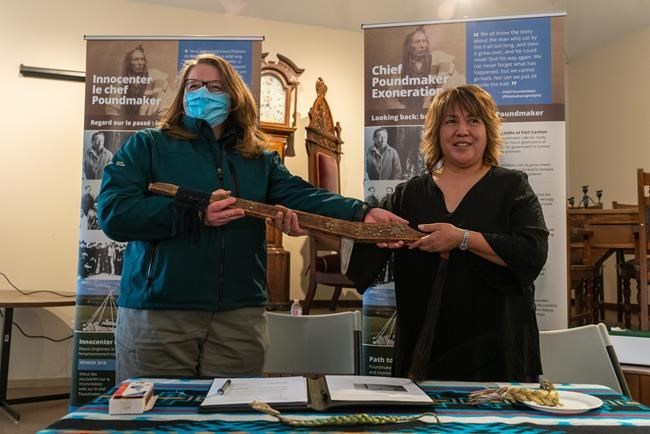BATTLEFORD, Sask. — An artifact believed to have belonged to a 19th-century Plains Cree leader who played an important role in treaty talks and was known as a peacekeeper has been returned to his descendants.
Parks Canada transferred a staff ascribed to Chief Poundmaker from a collection of historical objects under the agency's care.
The staff was returned during a private ceremony Wednesday at the Fort Battleford National Historic Site. It is part of a healing journey his family says will help Poundmaker's spirit rest.
"In our culture, all items have life," said Pauline Poundmaker, Brown Bear Woman, who is the great-great-granddaughter of Chief Poundmaker.
"There's power to these objects. That's why these artifacts don't belong in museums. The sacred ceremonial artifacts need to be taken care of by families."
A spokeswoman for Parks Canada said it acquired the staff in 1951 from Saskatchewan. It was initially one of several artifacts that belonged to the original North West Mounted Police Memorial and Indian Museum in Battleford, Sask.
Floyd Favel, curator of the Chief Poundmaker Museum, said Parks Canada had mischaracterized the staff as a work club, but it was used by the chief as a ceremonial staff that symbolized leading his people forward.
"By taking away the staff, what the Canadian government did was make us symbolically leaderless," Favel said.
Under Poundmaker Cree Nation laws, descendants are required to initiate and lead repatriation. Poundmaker's family members are striving to bring home his personal belongings, which they say were taken from him under duress.
Pauline Poundmaker said the family will lend the staff back to Parks Canada. It is to be held in a temperature-controlled and secure setting at the Fort Battleford historic site, about 130 kilometres northwest of Saskatoon.
The loan is temporary until the family is able to move the chief's belongings to a private museum on the Poundmaker Cree Nation. There are still dozens of his items in museums across Canada, the United States and Europe, his great-great-granddaughter said.
It is her goal to bring them all back.
"Today is page one. There are more pages to this story," she said.
Poundmaker — whose Cree name is Pitikwahanapiwiyin — is considered one of the great Indigenous leaders of the 19th century and was key in negotiations that led to Treaty 6, which covers the west-central portions of present-day Alberta and Saskatchewan.
He is also remembered as a peacekeeper during the Northwest Rebellion of 1885, making the site of Wednesday's ceremony significant to the family, as it was the area where the battle of Cut Knife Hill took place between Lt.-Col William Otter's government soldiers and several First Nations.
On May 2, 1885, Otter and his command attacked about 1,500 Indigenous people, including women and children. The Indigenous groups were able to overcome the attack and, during Otter's retreat, Chief Poundmaker persuaded other Indigenous leaders to stop the fight.
Poundmaker was later convicted of treason for leading his warriors in the battle against Canadian forces. He was sentenced to three years in prison, served seven months, and died shortly after his release.
In 2019, Prime Minister Justin Trudeau exonerated him.
"What's happening today is an opportunity to create a new memory and to move forward with our relationship with Canada," Pauline Poundmaker said.
"There has to be forgiveness."
This report by The Canadian Press was first published May 4, 2022.
Mickey Djuric, The Canadian Press
Note to readers: This is a corrected story. Previous version spelled first name Paulina.




